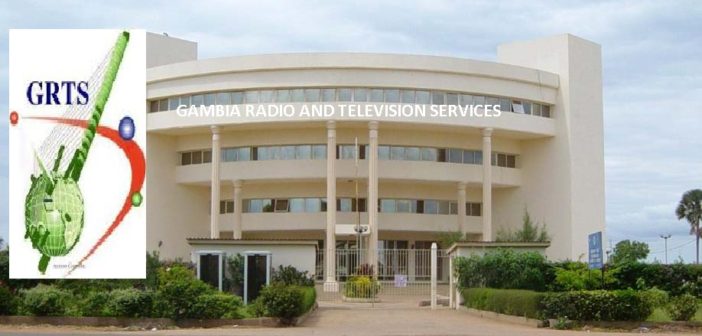 by Alagi Yorro Jallow.
by Alagi Yorro Jallow.Mamudu: The Gambia Radio and Television Services (GRTS) behemoth is chiseling away credibility and chasing away key talent. This could be the beginning of a painful decline of high expectations in public service broadcasting. Should haphazard political strategy, political correctness, and cannibalism continue, it would be challenging to bring back the national broadcaster, the GRTS, to the public service broadcasting role as a leading, dependable, and credible media house in the country? The grapevine has it that “politically active censorship of individuals and groups magazine program’s critical of the government are censored. Due to waning editorial independence, declining credibility could have a detrimental effect on the nation’s broadcaster, GRTS.
Mamudu: The media landscape is undergoing tremendous transformation, with new digital platforms emerging daily, competing for the same eyeballs and advertising revenue as operatives in the “traditional” media and not forgetting formidable competition risk from GRTS. These are challenging times. While GRTS remains relatively healthy on the balance sheet, yet GRTS is bleeding credibility and talent, critical drivers for any prosperous media business.No legal restrictions can be placed on freedom of expression and speech to control the responsible spread of information. The output of every news medium is judged by the public and not by the state authorities. Media freedom plunges to the worst level mainly due to government censorship and political pressures associated with the growth and pluralism.
Mamudu: The critical responsibility of The Gambia Radio and Television Services (GRTS) broadcasting, apart from disseminating government agenda, is to promote the image, culture, business, and geopolitical interests of the Gambia, both domestically and internationally. Like the German Television network of Deutsche Welle (DW) does for Germany, British Broadcasting Corporation (BBC) for Britain, Voice of America for the US, and France 24 for France. GRTS should not be in the business of regurgitating or rebroadcasting content from the BBC, CNN, or China’s CGTN.
The Gambia’s national broadcaster has no business airing league matches from European leagues or any other country unless such competition involves the Gambia. There is an adequate private broadcasting capacity for that purpose, including other private Signal distributors operating in the country. GRTS has a bigger agenda than merely competing for advertising revenue with private broadcasters. It is with this understanding that GRTS is publicly funded. Instead, GRTS should focus on telling the history of the Gambia, explaining her economy, the cultural diversity of her people, the language, arts, and culture of her people, innovations currently happening in our institutions of learning and industrial spaces, stories about Gambian personalities impacting the world, including our athletes, public intellectuals in prestigious school and highlights on the Gambia’s ” eminent personalities” in the diaspora and our geopolitical ambitions, etc.
In spare time, rather than promoting American and British interests by rebroadcasting the BBC and CNN, especially during prime time, such space can promote individual hotel groups and our national parks throughout the year. We can also use this time to showcase our farmers engaged in producing perishables for exports or promoting our diverse cultural heritage as the de-facto hub for business and cultural tourism globally. Alternatively, we can showcase our recent investments in logistics infrastructure, including rural electrification, mega infrastructural developments in urban and rural areas, and showcase the Banjul airport, promoting the Gambia Ports Authority as the leading regional hub for maritime traffic.
Mamudu: This space can be used to highlight interviews with officials tasked with promoting the Gambia abroad, including those from Branding the Gambia, export promotion, and commercial and cultural Attaches in our various embassies around the world. Then combine this effort with the power of social media, and we have a destination selling itself on various platforms without necessarily hiring disgraced models as brand ambassadors.
The only national broadcaster in Africa who seems to think this way is South Africa’s SABC, which has unfortunately also been riddled with mismanagement. We get excited with GRTS’s wastage in efforts like the Meet Farmers Tours, the English Premier League. However, BBC Sports (the main one intended for British audiences) will NEVER broadcast or even report on any match between Walliadan and Brikama United FC. Furthermore, this again is not about money but mindset.
Media freedom, especially information sharing through news reports, has been challenged by government censorship in countries with a low level of the democratic system. Freedom of speech in most of the African countries is still a myth, an ideal. If you do not learn how to write or tell your story intelligently, the chances of survival are minimal. The public media have their observations that should not be controlled by others. It is essential to preserve the independence of the public media, and obtaining objectivity of news is the responsibility given to journalists and media practitioners.
Mamudu: Journalism’s ethics changed due to self-censorship and official censorship, and when media lack ethics, it threatens peace and harmony rather than promoting it. National broadcaster lost its credibility due to censorship in an irresponsible manner. Public broadcaster can only promote peace and harmony when responsible journalism is practiced. Today, the Ministry of the Information and Communication Department staffers, those custodians of the national broadcaster’s public trust, are a pale shadow of their former selves.
 by Alagi Yorro Jallow.
by Alagi Yorro Jallow.
 by Alagi Yorro Jallow.
by Alagi Yorro Jallow.
 by Alagi Yorro Jallow.
by Alagi Yorro Jallow.
Ma sha Allah great and thanks for sharing